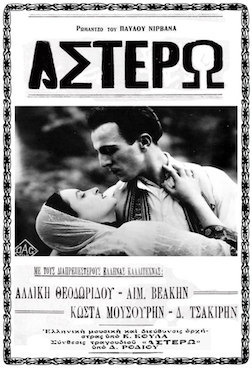Ipolochagos Natassa is a 1970 Greek film. It starred Aliki Vougiouklaki as Natassa, Dimitris Papamichael as Orestis, and Costas Carras as Max. The story about the German occupation of Greece and the resistance by the Greeks. The director of the film is Nikos Foskolos.
Attalus, a Macedonian from Lower Macedonia, was an important courtier and soldier of Philip II of Macedonia.

The cinema of Greece has a long and rich history. Though hampered at times by war or political instability, the Greek film industry dominates the domestic market and has experienced international success. Characteristics of Greek cinema include a dynamic plot, strong character development and erotic themes. Two Greek films, Missing (1982) and Eternity and a Day (1998), have won the Palme d'Or at the Cannes Film Festival. Five Greek films have received nominations for the Academy Award for Best Foreign Language Film.

Pelagonia is a geographical region of Macedonia named after the ancient kingdom. Ancient Pelagonia roughly corresponded to the present-day municipalities of Bitola, Prilep, Mogila, Novaci, Kruševo, and Krivogaštani in North Macedonia and to the municipalities of Florina, Amyntaio and Prespes in Greece.
Orestes or Orestis is a Greek name meaning 'mountain dweller'.
Madame X is a 1956 Greek drama film directed by Orestis Laskos. It is based on the 1908 play Madame X by French playwright Alexandre Bisson (1848-1912).

Landscape In The Mist is a 1988 Greek coming-of-age road tragedy film co-written and directed by Theo Angelopoulos. The film was selected as the Greek entry for the Best Foreign Language Film at the 62nd Academy Awards, but was not accepted as a nominee. A critics' poll by the Village Voice included it in the 100 Best Films of the 20th Century list. The film is the third installment in Angelopoulos' Trilogy of Silence, following Voyage to Cythera (1984) and The Beekeeper (1986). Since then it has been regarded as Angelopoulos' greatest masterpiece, one of the best movies of 1988, of the 80s, of the 20th century, and one of the greatest and best Greek movies of all time.
Ta Kitrina Gantia is a 1960 Greek comedy film made by Finos Films. It was written by Alekos Sakellarios and Christos Giannakopoulos, directed by Alekos Sakellarios, and starring Nikos Stavridis, Mimis Fotopoulos, Maro Kontou and Martha Vourtsi.
Nikos Stavridis was a Greek actor in film and theater.
Beata Asimakopoulou was a Greek actress.
Daphnis and Chloe is a work from the 2nd century AD by the Greek author Longus. This story is the basis of several works of art:
Allos gia to ekatommyrio is a 1964 Greek comedy film directed by Orestis Laskos and written by Nikos Tsiforos and starring Mimis Fotopoulos, Giannis Gkionakis, Beata Assimakopoulou, Vassilis Avlonitis and Eleni Anoussaki.
Praktores 005 enantion (C)Hrysopodarou or Praktores 005 ena(n)dion Hris(s)opodarou is a 1965 Greek comedy film written and directed by Orestis Laskos and starring Kostas Rigopoulos, Costas Hajihristos, Giannis Gkionakis, Beata Asimakopoulou, Giorgos Vrassivanopoulos and Giorgos Velentzas. The film was shot in black-and-white.
Léo Lasko (1885–1949) was a German screenwriter and film director of the silent and early sound eras. As Lasko was of Jewish descent he was classified as a "non-Aryan" by the Nazis. Following their 1933 takeover he was banned from film work and eventually emigrated to Britain.

Golfo is a 1915 Greek silent film directed by Konstadinos Bahatoris. It is the first Greek feature film and fustanella film. The fustanella is a pleated skirt-like garment that is also referred to as a kilt. The traditional Greek garment is still worn by the Presidential Guard of Greece. Another fustanella film is Astero (1929). Golfo was based on a popular Greek agricultural-themed play written by Spyridon Peresiadis. Golfo is a tragedy resembling William Shakespeare's Romeo and Juliet. It was the forerunner for agricultural-themed films in Greek cinema during the 1920s and 1930s inspiring films featuring sheep herders such as Astero (1929) and Daphnis and Chloe. The first synchronized sound film (talkie) in Greece was another fustanella shepherd romance inspired by Golfo released in 1932 entitled Sweetheart of a Shepherdess .

Daphnis and Chloe, is a 1931 Greek romance film written and directed by Orestis Laskos, based on the namesake novel of the 2nd-century writer Longus. It is sometimes said to be the first European film containing nude scenes. The 1897 film by George Méliès After The Ball was much earlier, but uses simulated nudity via use of body stockings.
The Beauty from Peran is a 1953 Greek-Turkish romance film directed by Vedat Örfi Bengü and Orestis Laskos and starring Katia Linta, Süha Dogan and Muazzez Arçay.

Maestro in Blue is a Greek drama television series airing on Mega Channel in Greece and through Netflix worldwide. The series consists of three seasons with a total of 19 episodes.

Astero is a Greek silent film directed by Dimitris Gaziadis in 1929. The film is considered a romantic fustanella film and was filmed in a rural Greek setting. The fustanella was traditional Greek attire. It is a pleated skirt-like garment that is also referred to as a kilt and was initially featured in the film Golfo. Dimitris Gaziadis wrote the screenplay in collaboration with Orestis Laskos. Laskos also wrote and directed the 1931 Greek silent film Daphnis and Chloe which was also filmed in an agricultural setting. The filming of Astero took place between 8-31 of March in 1929. A significant part of the filming took place in areas of the Peloponnese such as Mount Helmos, the Waters of Stygos, the Monastery of Mega Spilaio, the Diakopto–Kalavryta railway, Zachlorou, Mesorrougi, Solos, and Elatophyto.
Stella Greka is a Greek singer, who appeared occasionally in cinema, as an actress.






